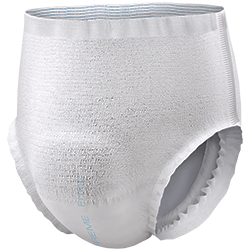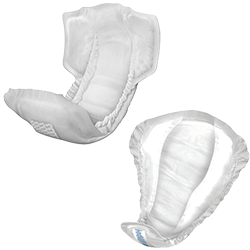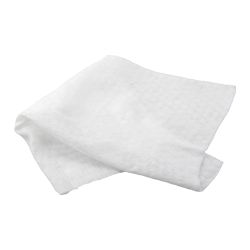Let’s Talk About Smells

When I started this blog, I promised you honest talk about things you’ll face, even if it’s uncomfortable. This post definitely fills the bill.
There’s no avoiding the fact that incontinence is all about the waste our bodies produce: urine and feces. Both of these can smell unpleasant, obviously, but there are things you can do to help reduce and manage them.
Urinary Leaks
Urine doesn’t usually smell that bad unless you’ve eaten asparagus or drank an inordinate amount of coffee, but it can have a distinct “musky” odor, even while fresh. And as urine breaks down, it can take on a strong ammonia odor.
Tips for minimizing smells:
-
Stay Hydrated - The more diluted the urine, the less odor it will have. This is also just good advice for your overall health. There is a balance here. You don’t want to be so hydrated that you need to constantly use the bathroom and change your protection, but you also don’t want to reduce your fluid intake to the point that your urine becomes concentrated. That’s bad for smells and bad for you.
-
Stay Clean - Every time you change your soiled or wet adult diaper, underwear, liner, or pad, you should use a wipe designed for the job. In addition to keeping you smelling fresh, they’ll also protect your skin from rashes. Barrier creams are also a nifty idea, but that’s another post.
-
Choose Products with Odor Control - Products that can neutralize the pH of urine can give you more time before “outing you,” so you can clean up and change your schedule. NorthShore indicates on each absorbent product whether it has this feature, and to what level.
Fecal Incontinence
This is such an uncomfortable topic for people that it has more euphemisms than I could (or should) ever list here.
Even properly contained, smell is going to be an issue. But there are still things you can do to mitigate odors:
-
Choose a Tab-Style Brief with a Plastic/PCV Backsheet - Breathable briefs are great for skin health and for keeping you more comfortable in warm weather, but if air can get out, so can smell. Pull-ons and liners can also work, but see the next section for pants that keep smells in.
-
Wear Extra Protection - A waterproof pant can do wonders to help keep little leaks from getting out, but the strong elastics also help keep smells in their place until you can get cleaned up and changed.
-
Change Your Diet - Odd though it may seem, this is a biggie. It also requires more effort, I know. The best advice I’ve found on the topic comes from an unlikely source: the Squatty Potty website. Changing how much and what you eat can help control odor and also reduce unpleasant surprises.
-
Change Your Absorbent Undergarment Immediately - I think this probably goes without saying, but I’ll say it anyway. In addition to being smelly and uncomfortable, feces contain all kinds of nasty things that are bad for your skin. The moment you have a bowel accident, remove the soiled garment, clean thoroughly, then change into a fresh liner or diaper.
Miscellany
-
Storage & Disposal – Even after you’re all nice and clean, you’re still left with a used … uh, product. Honestly, isn’t there a better word for that so I don’t have to keep typing “diaper, underwear, liner or pad”?
Storage – There are bins designed to accommodate incontinence products of all kinds and sizes, and keep smells from escaping. A good one seals up contents completely and also uses lightly scented liners to help address odors.
Disposal – There are also scented disposal bags - NorthShore DiscreetShield Disposal bags are heavy-duty ones and also discreet. They smell pretty good! You could use plastic grocery bags, which I often do, but if you can’t dispose of the product right away, or are out in public, the opaque, scented bags add nice peace of mind.
-
Temperature - This may sound odd, but you should keep used diapers, underwear, liners or pads as cool as possible for the same reason you keep meat in a refrigerator. Absorbent products kept outside or in the garage in July may not smell great come trash day. If you have a basement that stays pretty cool, see if you can find a way to store them there during the hot months. You could also try disposal bags (see above). The good news is that in most states, for several months, the garage or outside (assuming you don’t have a critter problem) will be just fine.
-
Hair Care – Finally, I’d like to end by talking about something you may have wondered about but couldn’t find anyone brave enough (dumb enough?) to talk about pubic hair. Yep, the shorts and curlies. If you’ve ever had to clean up spills on carpet and a bare floor, you know which is easier, right? A bare floor is easier. Now hold on, I’m not recommending you go all Telly Savallas on your nether regions, but I do want to make the point that hair makes effective clean-up harder, and hair holds smells very well. The more of it you have, the harder it will be to feel and smell clean. The less of it you have … well, you get the point. Thankfully, all shampoos have deodorants in them, so they do a great job at giving you a fresh start every time you shower or bathe. Shampoo: It’s not just for your head anymore.
Incontinence - urinary or bowel - comes with no shortage of challenges. Effective management requires forethought, planning and actions that may be new. But knowledge is power. The more you know, the better you’ll get at managing this curveball life has thrown at you, and the more confident you’ll feel.
Uncomfortable as these topics may be, I hope what you take away from them is that there are ways to handle your incontinence in ways that let you live your best life.
For help managing incontinence, visit NorthShore's Blog for more articles and tips or call the Customer Care & Service team at (800) 563-0161 for individualized assistance ... they are always willing to help!
Some years ago (I decline to say how many), life threw me a curveball and I found myself facing some new and frightening challenges, and having to navigate the confusing world of incontinence products alone. This was pre-internet and, frankly, pre-decent options. Through constant experimentation, I’ve found products that work for me—yes, many of which are sold by NorthShore Care—but the more important part of my journey has been internal. I’ve fought insecurity, isolation, paranoia that EVERYONE was staring at my butt, and fear that I’d never be able to return to the rich, full life I once had. I’m happy to say all of that was unfounded.
Part of the work I did to understand and accept myself included reading. A LOT of reading. I found articles that explained the different kinds of incontinence, blog posts about the various products that were available, and even pamphlets for drugs that were offered to solve my problem. What I couldn’t find was practical guidance and honest thoughts about living with this embarrassing, confusing, and occasionally hilarious new “feature” my body had to offer.
NorthShore gets it, and that’s why I’m here. NorthShore isn’t just a business that sells incontinence supplies, it’s a business built on a foundation of understanding of what you and I are dealing with every day.
I don’t work for NorthShore (would it be too cheesy to say I work for you?) but this feels like the right place for a blog that addresses real-world issues around incontinence. Here I’ll talk candidly, openly, and occasionally uncomfortably about the challenges we face, the products that can help us manage those challenges, and how to go about confidently getting on with our lives.
Let’s get real.
—Bill Edwards![]()












